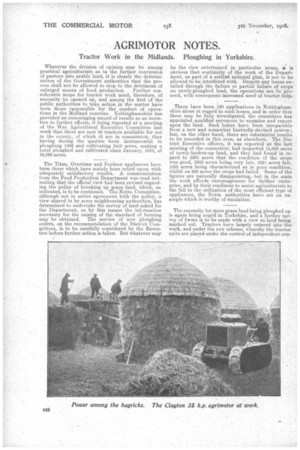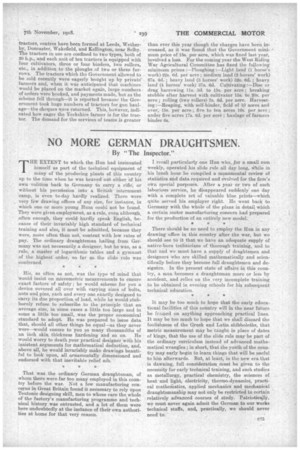AGRIMOTOR NOTES.
Page 18

Page 19

If you've noticed an error in this article please click here to report it so we can fix it.
Tractor Work in the Midlands. Ploughing in Yorkshire.
Whatever the division of opinion may be among practical agriculturists as to the further conversion of pasture into arable land, it is clearly the determination of the Government authorities that the process shall not be allowed to stop to the detriment of enlarged means of food. production. Further cog
• siderable scope for tractor work must, therefore, of necessity he opened up, and among the first of the public authorities to take action in the matter have been those responsible for the conduct of opera,tions in the Midland counties. Nottinghamshire has provided an 'encouraging record of results as an incentive to further efforts, it being reported at a meeting of the War Agricultural Executive Committee last week that there are now 58 tractors available for use _in the county, of which 45 are in commission,_they having during the .quarter been instrumental in ploughing 1492 and cultivating 3419 acres, making a total ploughed and cultivated since January, 1918, of 16,096 acres.
The Titan, Overtime and Fordson nppliatices have been those which have mainly, been relied uporr, with adequately satisfactory results. A communication from the Food Production Department was read intimating that the official view had been revised regarding the policy of breaking up grass land, which, as indicated, is to be continued. The Notts. Committee, although not in entire agreement with the policy, a view shared in by some neighbouring authorities, has determined to undertake the survey of land asked for the Department, as by this means the information necessary for the raising of the standard of farming may be obtained. The service of new plonghing orders, on the recommendation of the District Committees, is to be carefully considered by the Executive before further action is taken. But whatever may be the view entertained in particular areas, it is obvious that continuity of the work of the DepartMent, as part of a settled national plan, is not to be allowed to be interfered with. Despite any losses entailed through the failure or partial failure of crops on newly-plonghed land, the operations are to proceed, with consequent increased need of tractor help.
There have been 120 applications in Nottinghamshire alone in regard to such losses, and in order that these may be fully investigated, the committee has appointed qualified surveyors to examine and report upon the land. Such losses have been inseparable from a new and somewhat hurriedly-devised system ; but, on the other hand, there are substantial results to be recorded in this area, as elsewhere. The District Executive officers, it was reported at the last meeting of the committee, had inspected 15,695 acres of newly-broken-up land, and they had found in regard to 5501 acres that the condition of the crops was good, 3383 acres being very fair, 4321 acres fair, 1855 acres being characterized as in poor condition, whilst on 635 acres the crops had failed. Some of the figures are naturally disappointing, but in the main the work affords encouragement. for further enterprise, and by their readiness to assist, agriculturists to the full in the utilization of the most efficient type of appliances, the Notts. authorities have set an example which is worthy of emulation.
The necessity for more grass land being ploughed up is again being urged in Yorkshire, and a further survey of firms is to be made with a view to land being marked out. -Traetors have largely entered into the work, and under the new scheme, whereby the tractor units are placed under the control of independent cOp tractors, centres have been formed at Leeds, Wetherby, Doncaster, Wakefield, and Kellington, near Selby. The tract-ors in use are confined to two types, both of 20 h.p., and each unit of ten tractors is equipped with four cultivators, three or four binders, two rollers, etc., in addition to the ploughs of two or three furrows. The tractors which the Government allowed to be sold recently were eagerly bought up by private' farmers and, when it was anticipated that machines would be placed on the market again, large numbers of orders were booked, and payments made, but as the scheme fell through—it is reported because the Government took huge numbers of tractors for gun haulage—the cheques were returned. This, however, indicated how eager the Yorkshire farmer is for the tractor. The demand for the services of teams is greater than ever this year though the charges have been increased, as it was found that the Government minimum price of I5s. per acre, which was fixed last year, involved a loss. For the coming year the West Riding War Agricultural Committee has fixed the following minimum prices :—Ploughing :—Light land (1 horse's work) 22s. ed. per acre ; medium land (2 horses' work) 27s. 6d. ; heavy land (3 horses' work) 32s. 6d. ; heavy land (4 horses' work) 37s. 6d. Cultivating :—Elisc or drag harrowing us. 3d. to 15s. per acre ; breaking stubble al ter harvest with cultivator 13s. to 20s. per acre ; rolling (two rollers) 35. 6d. per acre. Harvesting :—Reaping, with self-binder, field of 1,0 acres and over, 15s. per acre ; five to ten acres 16S. per acre ; under five acres 17s. 6d. per acre ; haulage of farmers binder 6s.






















